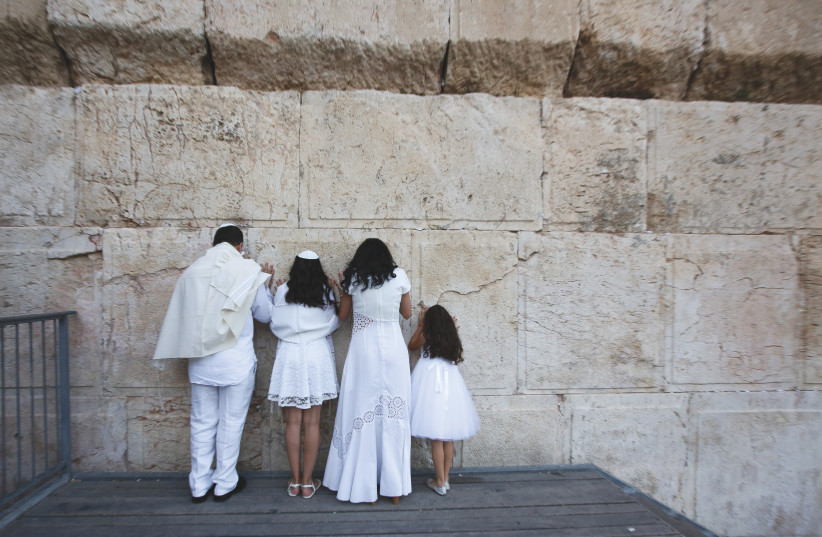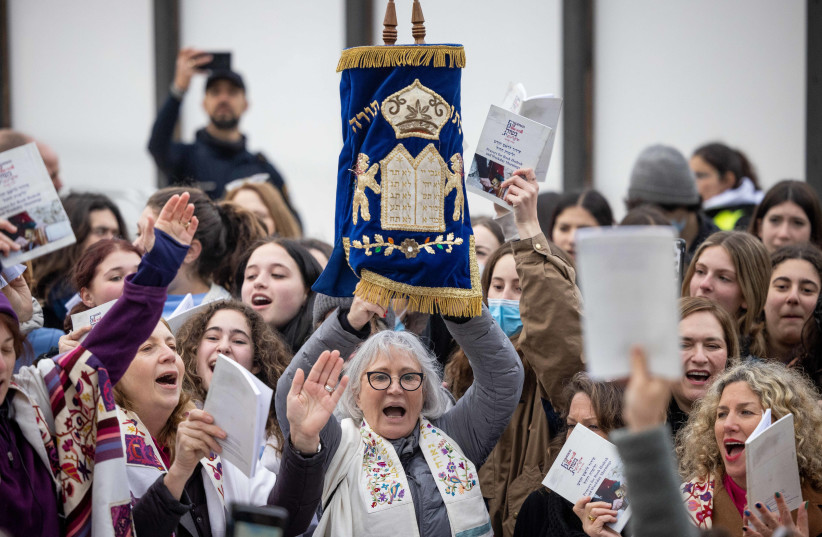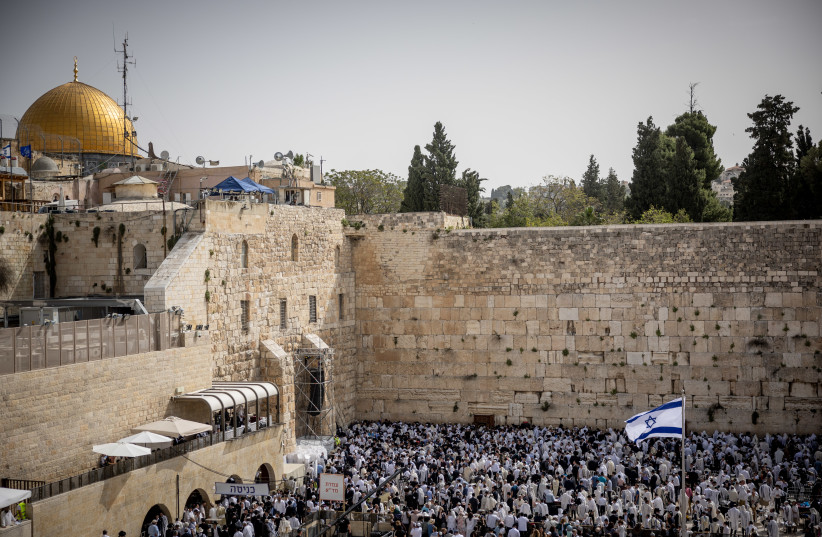Spiritual leaders have been establishing communities in Israel that don’t fit into any traditional Jewish category.
By ZVIKA KLEIN Updated: MAY 20, 2022
It felt surreal: A group of rabbis – male and female, from diverse backgrounds, including Orthodox – met this week at the Jerusalem Botanical Gardens in Jerusalem. The weather was perfect for an outside gathering, the first of its kind.
These hundreds of religious and spiritual Israeli leaders are part of a growing phenomenon of Israeli Judaism: they’ve established communities that usually won’t fit into any traditional Jewish box. One of these rabbis is the first to receive a full-time job at a secular kibbutz; another one is the first female Orthodox community rabbi, and there was also a son and grandson of senior Sephardi rabbis who hopes to become a Conservative rabbi, but brings his own special flavor of ancient tunes he sings and plays as a musician.
Would all of this have been possible five years ago? Probably not.
This conference is one of many phenomena that have been booming all across Israel in the past half a decade. A new study in the works claims that what has allowed this to happen is the Kotel compromise that was passed by the Israeli government but then canceled. The cancellation created a huge clash between progressive Diaspora Jewish leaders and the State of Israel, and led to many developments, such as the one mentioned but also others: a doubling of the Reform and Conservative movements in Israel and an influx of organizations and foundations that began investing in Jewish peoplehood in Israel and connecting Israelis to their counterparts in the Diaspora.
The Kotel compromise was reached between Orthodox and non-Orthodox Jewish denominations, according to which the non-Orthodox “mixed” prayer area for men and women was supposed to be expanded in the southern part of the Western Wall. Access to this “mixed” prayer area was supposed to be from the main entrance to the Western Wall, and in addition, it was supposed to be run by a council that would include representatives of the non-Orthodox denominations and Women of the Wall. The plan was approved by the Israeli government in January 2016, but under pressure from the ultra-Orthodox haredi parties, the government backtracked from the plan in June 2017, exactly five years ago.
Members of the Women of the Wall, Conservative and Reform Movement hold Rosh Hodesh prayer at the Western Wall in Jerusalem Old City, March 4, 2022. (credit: YONATAN SINDEL/FLASH90)THE HONEY FOUNDATION for Israel is a small foundation that created the conference for this diverse group of Jewish Israeli leaders. The foundation, headed and established by Bill Lipsey, a businessman from New Jersey, became active in Israel in the past five years. According to the foundation’s site, “we are accelerating a revolution in Israeli Judaism and deepening the impact of rabbinic work in Jewish community building.” They invest in these small communities and emerging leaders, creating a new ecosystem of possibly a new branch in Judaism, Israeli Judaism communities.
Lipsey told The Jerusalem Post this week that he is so proud of the growing phenomena in Israel since “in the US this could never happen. The fact that such a diverse group of religious or spiritual leaders all met together in order to learn and teach each other about ways to teach Judaism or prayer services is an Israeli story in the making. I feel that the American Jewish community has so much to learn from what we are seeing here.”
Foundation CEO Limor Rubin actually became inspired by Jewish renewal in the US. She agreed that five years ago, when the Lipsey family approached her, she had no idea why Israelis would want to create local Jewish renewal or Israeli Judaism communities. Yet she admits that she was wrong and is today considered one of the accelerators of this growing phenomenon.
“In the last decade, there has been a steady increase in the activity, penetration and legitimacy of the Reform and Conservative movements in Israeli society,” states a study in the works, written by an up-and-coming Israeli think tank that preferred to not be mentioned until the report is finalized.
The initial study suggests that the rise of these movements in Israel is a direct result of the government’s decision to pass, and then cancel, the Kotel compromise.
According to data from a wide range of think tanks, the numbers of Israelis who identify with either Reform or Conservative Judaism is on the rise: According to a 2016 Pew survey, with data from 2014 and 2015, relatively few Israeli Jews identified with either Conservative (2%) or Reform (3%) Judaism. Throughout the years since then, other polling firms have shown a significant rise: The Jewish Peoplehood Policy Institute claimed in 2017 that these movements reach an affiliation of 13% (Reform – 8%; Conservative – 5%). The Hiddush organization released similar numbers in 2020, with 11% of Israelis identifying with these movements. According to these numbers, there are hundreds of thousands of Israelis who identify with this ideology.
In addition, in the current Knesset, there are at least three MKs who are members of a Reform or Conservative synagogue in Israel, who speak about the fact outwardly: MKs Alon Tal (Blue and White) and Amichai Shikli (Yamina) are members of Conservative communities in Israel. Shikli himself grew up in a household where his father was one of the heads of the Masorti Movement in Israel. And there is also, of course, MK Rabbi Gilad Kariv (Labor), who heads the Constitution, Law and Justice Committee in the Knesset. Kariv headed the Reform movement in Israel for years, and became the first Reform rabbi to become a member of Knesset.
ONE OF the people who can say he sabotaged the Kotel compromise is Yehuda Vald, now director-general of the Religious Zionist Party (headed by Bezalel Smotrich), who then served as deputy CEO to the Liba Center, a lobby group that has been fighting any sort of acknowledgment of progressive streams in Israel. He, for example, invented the term “Reform Wall” as a code name for the southern plaza of the Western Wall, which was designated for these streams to allow for egalitarian prayer.
Priestly blessing at the Western Wall in Jerusalem during Passover, April 18, 2022 (credit: YONATAN SINDEL/FLASH90)“Branding the egalitarian prayer section as “the Reform Kotel” is something we worked very hard to implement. This is our terminology, and you can hear it being used today in the political world and by people from different areas of life in Israel,” said Vald.
The idea was for the term to be a derogatory name for the holy site. He explained that “we understood that if the government would have gone through with the Kotel deal, there would be broad implications on the identity of the state as a Jewish state.”
Vald explained that those who made them understand the larger implications were actually the streams themselves. “They celebrated the victory of the Western Wall plan. They said outwardly that this is just the beginning of a struggle for reforms in marriage, conversion and all the issues of religion and state.”
When asked if there were any mistakes they made, as a group, fighting the Kotel agreement, Vald answered that he agrees that the public may view the streams differently because of the Kotel crisis. “I regret the fact that there are more Israelis nowadays that have empathy and a greater understanding of the streams.”
He also explained why he thinks this happened. “We were very busy defending Orthodoxy and not initiating anything or trying to connect. We were firm on our mission to stop the deal and to explain why we think that the Reform ideology is a dangerous worldview for Israel – and we were successful.”
He added, “I think it is also important for our constituents to understand the difference between Reform Judaism as a conception, and Reform Jews as Jews, our brothers.”
Vald also mentioned the fact that Rabbi Eliezer Melamed, one of the most senior rabbis in the Religious Zionism world, has spoken out numerous times, in the past three years, saying that there needs to be dialogue between Orthodox rabbis and leaders of the progressive streams. Melamed took part in a conference organized by the Makor Rishon right-wing Israeli newspaper in 2019. He held a dialogue with French Reform Rabbi Delphine Horvilleur via Zoom under the guidance of Israeli-Canadian Prof. Gil Troy. The content of the very polite and inspiring conversation wasn’t relevant: From now on, Melamed has become the enemy of many senior rabbis in the Orthodox world. He’s since written many columns about the importance of dialogue, and is constantly under attack for promoting these values. Vald and most of his colleagues disagree with Melamed’s approach.
There were many leaders of the fight for egalitarian prayer at the Kotel. The most constant group, for many years, was Women of the Wall. Other leaders were and are heads of the Reform and Conservative movements in Israel and in North America. One of the more vocal leaders, mainly in the Israeli media and political events, is Dr. Yizhar Hess, formerly the director-general of the Masorti (Conservative) Movement in Israel and nowadays deputy chairman of the World Zionist Organization.
“I agree with the study: the haredi and Hardal [nationalist ultra-Orthodox] leaders who overthrew the Western Wall compromise made a strategic mistake,” he said this week. “Public sentiment is more open today than ever before to Jewish identity and taking ownership of its practice.
“Orthodoxy, in its different manifestations, refuses to provide a solution that will address a more flexible conception of halachic commitment and the Jewish conception of openness to the non-Orthodox groups in Israel, creating a surge of interest in what we have to offer. This phenomenon is amazing and positive in my eyes. There is enormous curiosity today for non-Orthodox Judaism.
“I feel that Israeli society today is mature enough to connect to the message of Reform and Conservative Judaism. As opposed to secular Judaism, which does not see any significant reason for life involving a synagogue, we manage to present the synagogue as an attractive Jewish experience, which is something that Orthodox Judaism does not deal with at all,” Hess said dramatically.
Hess himself also branded the egalitarian section, officially named Azarat Yisrael (the section of Israel), calling it “Kotel Hamishpahot” (the family Kotel).
“Although our plaza looks less beautiful and inviting – it is not as festive as the large and familiar extension – sometimes there are more bar and bat mitzvah ceremonies on the egalitarian side of the Western Wall,” he said. “We can learn from this that the public in Israel understands that there is more than one way to be a Jew. I am sure that the Western Wall plan will be implemented; it’s a matter of time. I feel the revolution will come as a grassroots request of the people.”
When asked if there is anything he would do differently five years ago, Hess said, “It is possible that our justified celebration on the day of the signing of the Western Wall plan was too blatant, in a way that helped the opponents of the plan to fight it.
“On the other hand, there is a reason we celebrated this way – because we had to show our constituents and explain to them that we agreed to an unequal paradigm of separate but not totally equal.”
“We tried to meet with senior Israeli decision-makers and major Israeli institutions at the beginning of 2017, but most of them wouldn’t even meet us,” said Naama Klar, director of the Koret International School for Jewish Peoplehood.
During the critical years of the Kotel crisis, she was the manager of the Reut Institute and led a team of researchers and doers that dealt with this complex situation. “We understood that if Israeli society did not renew the covenant with the Jews of the world, the Zionist covenant would be harmed, because Israel is the home of all the Jewish people.”
She explained that before the Kotel crisis, the doors were totally shut. “The Diaspora Affairs Ministry and its deputy director, Hagay Elitzur, were the only ones who agreed to partner with us. We held seminars for Israeli bodies and movements on Jewish peoplehood.”
One of the first groups was the forum of Israeli youth movements. Fast-forward five years, and every Israeli youth movement – including the haredi ones – have a “Jewish peoplehood coordinator,” a professional who is paid to promote Jewish peoplehood in their movements.
“We approached public policy bodies such as the National Security Council, the National Economic Council and government ministries – no one agreed to meet us.”
Yet after this painful and difficult clash, suddenly something changed.
“The Western Wall compromise made us understand that this is not an Israeli matter but an international Jewish one. The intensity of the reactions surprised everyone: The Israeli media went crazy when a Jewish-American philanthropist decided to stop funding projects in Israel. It was clear to everyone, even to those who did not understand the broad picture, that this was an internationally Jewish issue. Suddenly the National Security Council invited me and others for a briefing. They understood that they needed to get acquainted with why this is such a big issue to Diaspora Jewry.”
Klar established the Jewish Peoplehood Coalition, a group of hundreds of individuals and organizations that focus entirely or partially on connecting Israelis to Diaspora Jews. Klar’s group became the hub or even an entirely new ecosystem of Israelis promoting Jewish peoplehood.
And Klar wasn’t alone: foundations began funding projects that were intended to get Israelis more acquainted with Diaspora Jews: the Ruderman Family Foundation, Gesher, Jewish federations such as those of New York and San Francisco and, of course, their umbrella organization, the Jewish Federations of North America. Even semi-haredi organizations began promoting this connection between Israelis and Diaspora Jews. The Israeli government has begun investing in “educating” Israelis about Diaspora Jews; hundreds of Israeli opinion leaders participated in “reverse Birthright” trips to Jewish communities across the world.
“Five years ago,” Klar concluded, we were maybe 40 people in Israel trying to promote a connection between Israel and the Diaspora. Now there are tens of thousands of Israelis, if not more.”•
Copyright © 2022 Jpost Inc. All rights reserved



